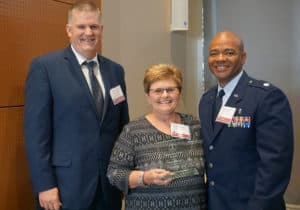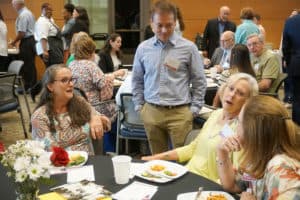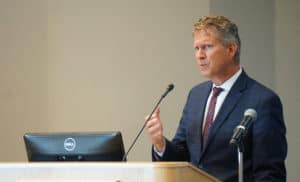CHP Celebrates 100 Years of Medical Laboratory Sciences at UAMS
| The Medical Laboratory Sciences program has an illustrious history at UAMS that stretches 100 years.
On Aug. 18, the College of Health Professions celebrated that history at the annual Alumni Weekend, inviting all program alumni for a luncheon. More than 100 people attended the Dean’s Luncheon, including 29 students, 44 alumni, previous program faculty as well as program friends and supporters.
“I was pleased with the response to the event,” said Cherika Robertson, M.Ed., an assistant professor in the Department of Laboratory Sciences who has been researching the program’s history and helped plan the luncheon. “Two alumni who were in the same class said they had a great time reconnecting with each other and perusing the photo books, which took them for a walk down memory lane.”
The Medical Laboratory Sciences (MLS) program began in 1918 as Laboratory Training and was a division of the Pathology Department in the College of Medicine. In 1938, the program officially became the School of Medical Technology, and in 1967 the School of Cytotechnology was developed. Both programs were part of the original School of Health Related Professions, which formed in 1971 and was changed to the College of Health Professions in 2012. In 2012, the name of the Medical Technology program changed to Medical Laboratory Sciences.
Jo Kathryn Mitchell, who graduated from the program in 1955, has seen a lot of changes in the program and at UAMS over the years. Mitchell worked at UAMS when it was located near MacArthur Park and moved with the campus to its current location.
“So much has changed that it’s almost overwhelming, but it’s all been for the better,” she said.
In addition to celebrating the past, participants also looked to the future of the program and the profession.
Blair Holladay, Ph.D., the CEO for the American Society for Clinical Pathology, served as the event’s keynote speaker. He discussed the history of laboratory medicine, beginning in 300 BC and continuing through the 1880s, as he examined the pioneers of the field. He then turned his attention to the 21st century and concluded with a discussion of cutting-edge laboratory testing and the new skills and knowledge needed for current and future laboratory scientists, said Robertson.
“His presentation demonstrated how laboratory medicine began, and how laboratory science has evolved to include genomics, data analytics, bioinformatics, electronic health records, laboratory automation and robotics,” she added. “He clearly illustrated how laboratory scientists remain a vital member of the health care team.”
Susan Long, Ed.D., dean of the College of Health Professions, agreed the field is more important than ever.
“With more than 70 percent of medical decisions guided by lab tests, medical laboratory scientists are crucial to the health care system,” said Long. “The Medical Laboratory Sciences program is moving to the forefront of MLS education, preparing our graduates to enter into this very important, high-demand profession.”

Nathan Johnson, Ph.D., poses for a photo with Cindy Osburn, who was presented with the MLS Outstanding Service Award, and with Air Force Lt. Col. Keye Latimer, who was presented with the MLS Distinguished Military Service Award.
Nathan Johnson, Ph.D., chair of the Department of Laboratory Sciences and director of the Medical Laboratory Sciences program, organized a slide show of photographs submitted by program alumni.
“It was such a privilege to sort through the photos provided by our alumni and see how the program has evolved over the years,” he said. “We have such a rich history and such a bright future.”
Several awards also were presented during the luncheon. They were:
- MLS Distinguished Alumnus Award — Hope Hollyfield, Class of 2015, for her advocacy of the medical laboratory profession;
- MLS Outstanding Service Award — Cindy Osburn, the department’s executive assistant for more than 30 years;
- MLS Distinguished Military Service Award — Air Force Lt. Col. Keye Latimer, Class of 1996, for his outstanding performance of clinical laboratory duties to the United States military as an active duty officer or enlisted member.
The MLS Faculty Service Award was also presented to several faculty members who have displayed outstanding, broad-based and long-term service to the department. On hand to receive the award were Sandra Ackerman, Letycia Nunez Argote, Cherry Childs and Lugene Woods. Several other faculty members weren’t present but were also recognized — Susie Aycock, Margaret Bartelt, Karen Hunter, Martha Lake, Kathleen Mugan, Camille Pridgen, Don Simpson and Suzanne Tank.
Current students of the program, as well as those who have received scholarships, were also recognized.


